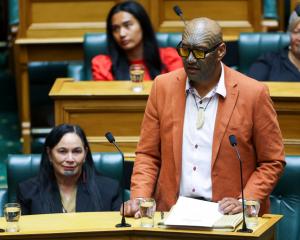
The forum included heads of government from many of our closest neighbours. As well as Ms Ardern's attendance, Deputy Prime Minister and Foreign Affairs Minister Winston Peters was also present, as were media.
While the rest of the contingent headed to Nauru on Monday for the three-day trip, Ms Ardern's 11-week old daughter, Neve, was too young to receive the required vaccinations and couldn't travel. Ms Ardern decided three days away from Neve was two days too long.
Instead, the Royal New Zealand Air Force 757, which had been due to spend the forum an hour's flight away on the Marshall Islands, flew the much longer flight back to New Zealand to collect Ms Ardern early Wednesday morning.
It was suggested by some Ms Ardern should have missed the forum altogether. That is not reasonable. The forum is an important diplomatic event in a region vital to New Zealand's future. No New Zealand prime minister has missed it in more than 40 years.
It was also suggested the incident proved Ms Ardern could not perform the roles of prime minister and new mother at the same time, despite her doing exactly that.
Attacks on the extra flight's cost - reportedly in the vicinity of $80,000 - were more reasonable. Of course, governments deal with numbers far bigger than the normal household and, given that perspective, it is easy to see why the reported figure was defended as trivial by some.
Yet this is money scrounged together from a country struggling with a mountain of spending requirements and a considerably smaller pile of cash to implement them. The bulk of that government cash comes from taxpayers. It is never unreasonable for those taxpayers to question the spending of their taxes.
Spending aside, the real cost of Ms Ardern's special flight was the lost opportunity to showcase the realistic practicalities of being a new mother and full-time worker at the same time - something she has often spoken about. When the opportunity came for action, what Ms Ardern chose to do must have left many other parents scratching their heads.
Looking after a baby is a full-time job. If it is not the mother doing that job - and in 2018 there is no expectation it must be - it will be someone else, most commonly the other parent.
In this case that other parent is Ms Ardern's partner, who has taken on the role of stay-at-home dad. For women to have the workplace opportunities afforded to men over the last century, and there is broad support they should, stay-at-home fathering must become a more accepted role.
While fathers cannot produce milk, parents quickly learn about milk banks, breast pumps and infant-formula to ensure a baby's dietary needs are met if the mother must travel. For the average New Zealand family trying to juggle a new mum returning to a full-time and travel-heavy job, these are the only options.
There may be personal or medical reasons complicating this particular matter, though for most New Zealand parents such issues are the realities of life with a new baby. Accessing a military aircraft at their leisure is not.
The Prime Minister could have used this week's Nauru trip as a chance to show what a more gender-balanced New Zealand might look like.
Instead, the message she sent New Zealand's stay-at-home dads was not an uplifting one: Yes, you can be a full-time parent, but not for any longer than one day at a time.












